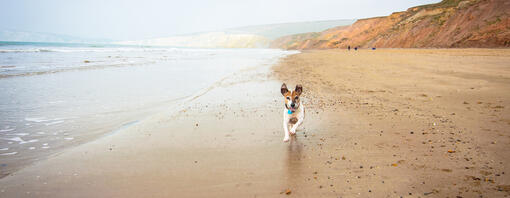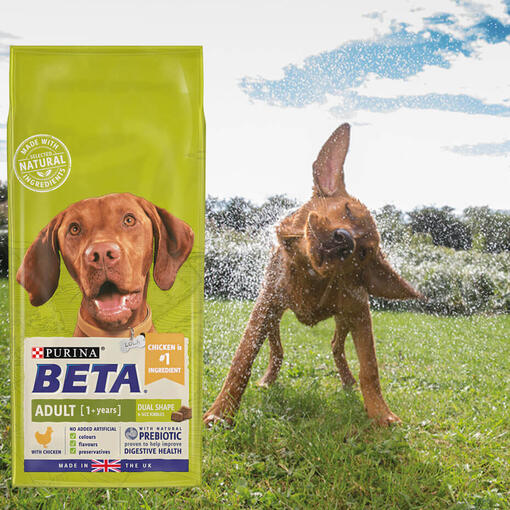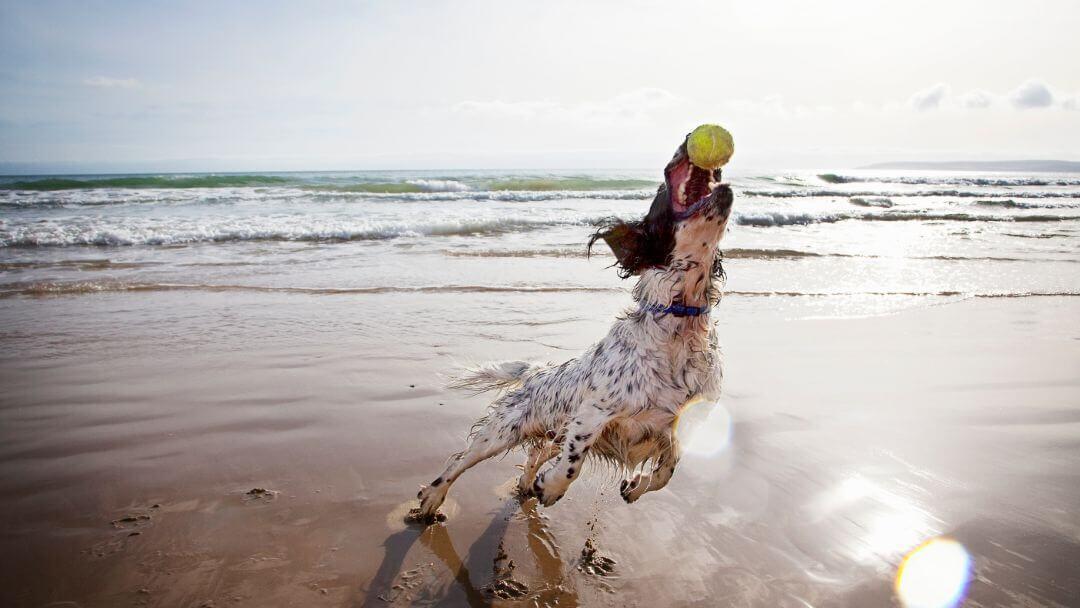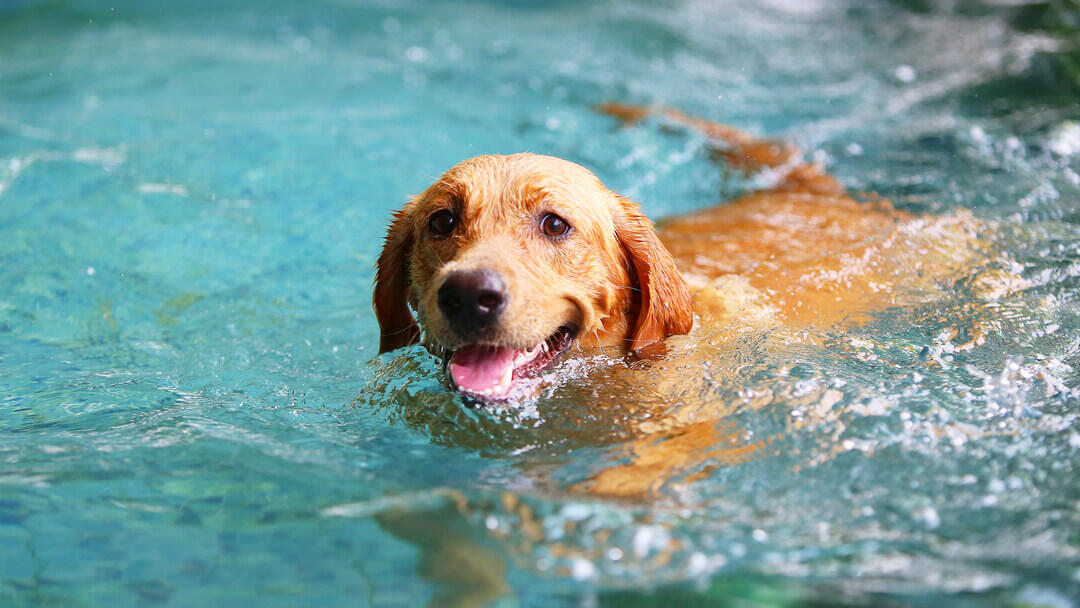


If you're a dog owner, when the sun comes out it's only natural that you'll want to head down to the beach with your furry friend. But what should you know before going? Read these tips to have a great day out.
Taking a dog to the beach can be so much fun! Whether your pet enjoys a splash in the sea or a run through the sand, there’s so much for canines to gain from getting out in the fresh air during the summer. Oh, we do like to be beside the seaside!
But there are a few things that pet owners should consider before packing up the car with buckets and spades and heading out to the coast. Whether it’s considering your dog’s safety out on the beach or choosing the right location for your sea-soaked games of fetch, make sure that you’re fully prepared for a day of fun with these useful tips for going to the beach with your dog.
Find dog friendly beaches
Before you take your dog to the coast, it’s important to check that dogs are allowed on the beach. Some beaches maintain a dog-free policy, others have specific months that dogs are allowed or specific places, while others are totally dog-friendly all year round, so make sure that you do your research before turning up at your destination.
Luckily, there are plenty of dog friendly beaches around the country to choose from! These locations are usually well advertised and will specify exactly where you and your pup are allowed to play, swim, run about or just hang out and have a picnic.
Some beaches have dog-free zones but allow pets to roam free in other sections. Pay close attention to signs in order to make sure that you aren’t trespassing into the wrong part of the beach. Be aware that, while some beaches may welcome dogs through the winter months, policies can change when areas get busier during the summer.
Dog owners can face significant fines if found to be in the wrong zone accompanied by their pet. Don’t sour a sunny day at the seaside; do your research first and always pay attention to signage!
If you are still not sure, contact the local dog warden for wherever you plan to visit – or try searching online for information. Sites like https://www.thebeachguide.co.uk/dog-friendly can be really helpful.
The best dog beach games
Taking a dog to the beach gives both owners and pets the perfect opportunity for exercise and fresh air. There are huge benefits both mentally and physically from spending time outdoors. From the additional vitamin D, to the extra calories burnt, there’s really no end to the benefits… and that’s just for owners!
The space that the beach gives you can make for a fabulous day out – whether you use it for training, recall practise, play, paddling or just a long walk on the sand. Make sure you take your dog’s favourite toys – ideally ones that float and that are washable afterwards!
Many water-loving breeds enjoy the challenge of a good game of fetch out into the sea or into rock pools, but do ensure that all pools are safe, watch out for strong currents or large waves (so stay close to shore), and make sure your pet is a confident swimmer before encouraging them into the water.
Tips for dogs swimming in the sea
Strong currents and unexpected waves mean that sea swimming is best avoided for most dogs – and paddling in calm shallows or rock pools is a far safer and fun beach activity. Some dogs are natural swimmers however and you will struggle to keep them from leaping in and splashing around! Always make sure it is safe first – and keep an eye on them to make sure they don’t get into any difficulty.
Smaller dogs may be intimidated by the large expanse of water and the waves and aren’t even keen on getting too close to even the tiniest waves, while others simply aren’t such fans of getting wet. Shar Pei dogs for example are often afraid of water. Look up information on your pet with a dog breed library and find out how they might typically react to the ocean and water before you take a trip to the beach, so that you can be more prepared for their initial response. They might enjoy sitting watching the waves than dipping a toe in it.
If you have a real water baby, however, find calmer patches of seawater for your pet to swim in. Don’t encourage them to enter the sea when waves are particularly choppy and avoid areas that are popular with motorised boats and surfers.
Top tips for taking care of your dog at the beach
Dogs can often forget what’s best for them in the heat of the moment, so while they’re enjoying themselves at the seaside, you need to pay attention to their needs. Make sure that your pet is always wearing their collar and identification tag; overexcited dogs at the beach can get carried away especially with the joy of chasing seagulls!
Ensure that there is access to fresh, clean water while your dog is at the beach. It’s incredibly tempting for dogs to lap up that lovely, salty seawater, and whilst a little isn’t going to hurt them, too much may make them unwell and even a little will make them thirsty and need to wash their mouth out.
If it’s a sunny or hot day, then it’s also important to provide your pet with a shaded spot to take a break: all that fun can be exhausting!
Did you know that dogs can get sunburnt too? Keep an eye on breeds with light or thin hair to ensure their skin doesn’t get damaged during extended exposure to the sun. Any area where there is no hair can get burnt – and if you own a hairless breed, they will need all over protection which should be reapplied frequently. You can even purchase special suncream for dogs before a trip to the beach.
Do I need to wash my dog after the beach?
You should always give your pet a thorough rinse after a trip to the beach in order to remove any sand or salt that has built up in their fur, which could cause skin irritation and dry out their coat. Don’t forget to wash under their collar or harness – and wash the collar and harness! Also check all buckles and clips after a trip to the seaside.
Always use dog specific shampoo – and after a beach trip, long coated breeds or those with sensitive skin may need conditioning too.
For more tips, read our guide to going on holiday with your dog.

More articles by Beta


















